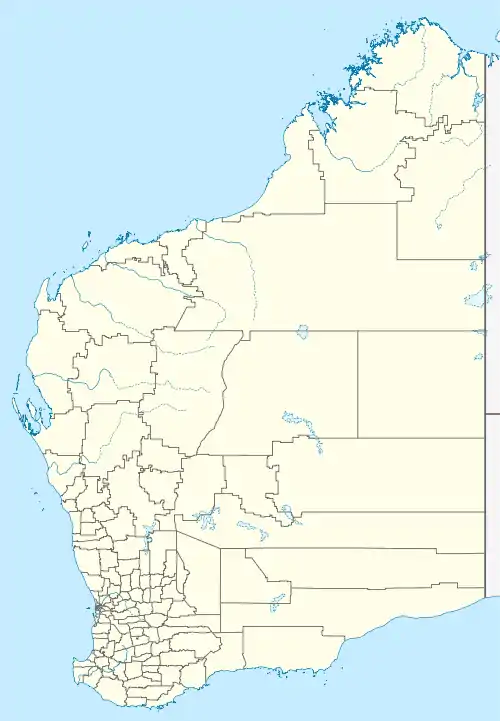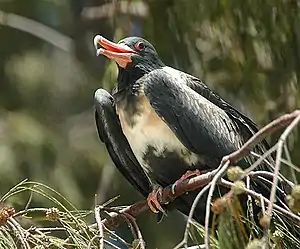Adele Island (Western Australia)
Adele Island is an island located in the Indian Ocean approximately 104 kilometres (65 mi) North of Ardyaloon off the Kimberley coast in Western Australia.[1][2]
 Adele Island Location of Adele Island | |
| Geography | |
|---|---|
| Coordinates | 15.5242°S 123.1573°E |
| Area | 217 ha (540 acres) |
| Length | 2.9 km (1.8 mi) |
| Width | 1.6 km (0.99 mi) |
| Administration | |
Australia | |
| Demographics | |
| Population | 0 |

.JPG.webp)
Description
The island is fish-hook shaped and has a length of 2.9 kilometres (2 mi) and a width of 1.6 kilometres (1 mi) and a total area of 217 hectares (536 acres). It is low-lying and surrounded by extensive sandbanks lying over a limestone platform forming a large lagoon.[2]
History
Nicolas Baudin named the island in 1801 as part of his expedition around Australia.[3][note 1] The name of the island was first charted on the Freycinet Map of 1811. It was declared a Nature Reserve in 2001 in recognition of its status as a bird breeding sanctuary. Since then the Department of Environment and Conservation has embarked on a campaign to eradicate the island of the Polynesian Rats that are a constant threat to the native seabirds.[4]
An acetylene-powered lighthouse was built on the island in 1951 it was later upgraded to solar power in 1985.[5]
Birds
The island is classified by BirdLife International as an Important Bird Area for its seabirds and waders. As well as breeding cormorants and Australian pelicans, globally important bird species breeding or staging on the island are lesser frigatebird with 2000-5700 breeding pairs, brown booby with 1500-8500 breeding pairs, grey-tailed tattler with up to 5500 individuals, and red-necked stint with up to 4100 individuals.[6]
Rolloliths
Rollolith is also found in Adele Island. It is the basic name given to benthic creatures.[7] Rolloliths can be made ofbarnacles (balanuliths); coral (corallith); vermetulid worms (vermetuliths); red crustose coralline green growth (rhodolith); or bryozoans (bryoliths).[8]
References
- Adèle Island. Google.
- Adele island. Archived 29 April 2012 at the Wayback Machine The Kimberley Coast.
- Freycinet, L. (1815) Voyage de Découvertes aux Terres Australes Exécuté sur les Corvettes le Géographe and le Naturaliste et la Goélette le Casuarina, Pendant les Années 1800, 1801, 1802, 1803 et 1804; sous le Commandement du Captaine de Vaisseau N. Baudin.Published: de l'Imprimerie Royale.
- Pappas, Stephanie (10 August 2015). "Beautiful, Rat-Filled Island Seen From Space". livescience.com. Retrieved 12 August 2015.
- "Adele Island - Admiralty Reference # 1640". Lighthouses of Western Australia. 2012. Retrieved 3 August 2014.
- "IBA: Adele Island". Birdata. Birds Australia. Archived from the original on 6 July 2011. Retrieved 18 May 2011.
- "Rolloliths of Adele Island | Marine Life of the Kimberley Region". museum.wa.gov.au. Retrieved 6 December 2018.
- "Rolloliths of Adele Island | Marine Life of the Kimberley Region". museum.wa.gov.au.
Notes
- Some sources state that Baudin discovered the island, but this is highly debatable and in reality highly unlikely. Australia was visited by Dutch explorers in the 17th century (hence "New Holland") and later, in 1699, by William Dampier after whom the Dampier Archipelago is named. Dampier sailed northwards along the western coast towards Timor passing many islands on the way. Also, it should not be forgotten that fishing fleets from Indonesia, especially Makassan trepangers, have a long history of visiting the Australia coast.